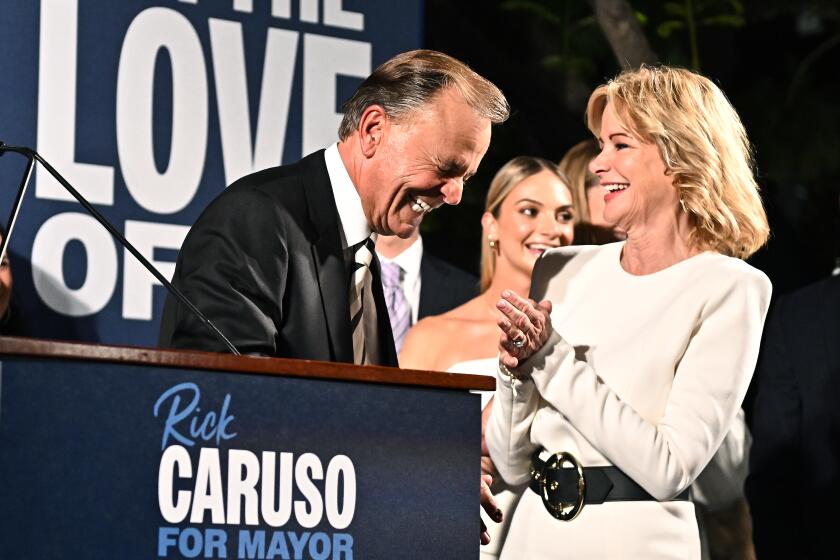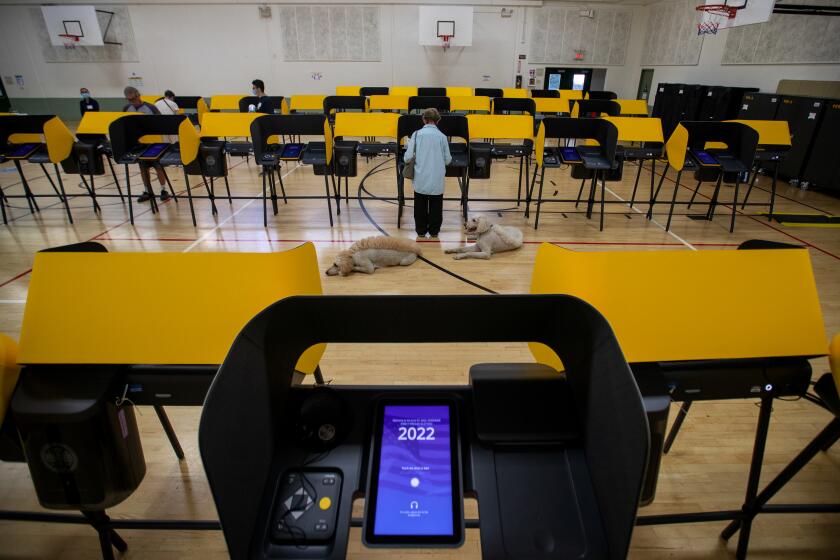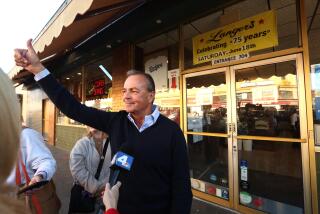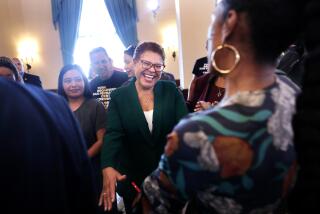News Analysis: Voters liked Caruso’s ‘can-do’ message. How far will he get in November?
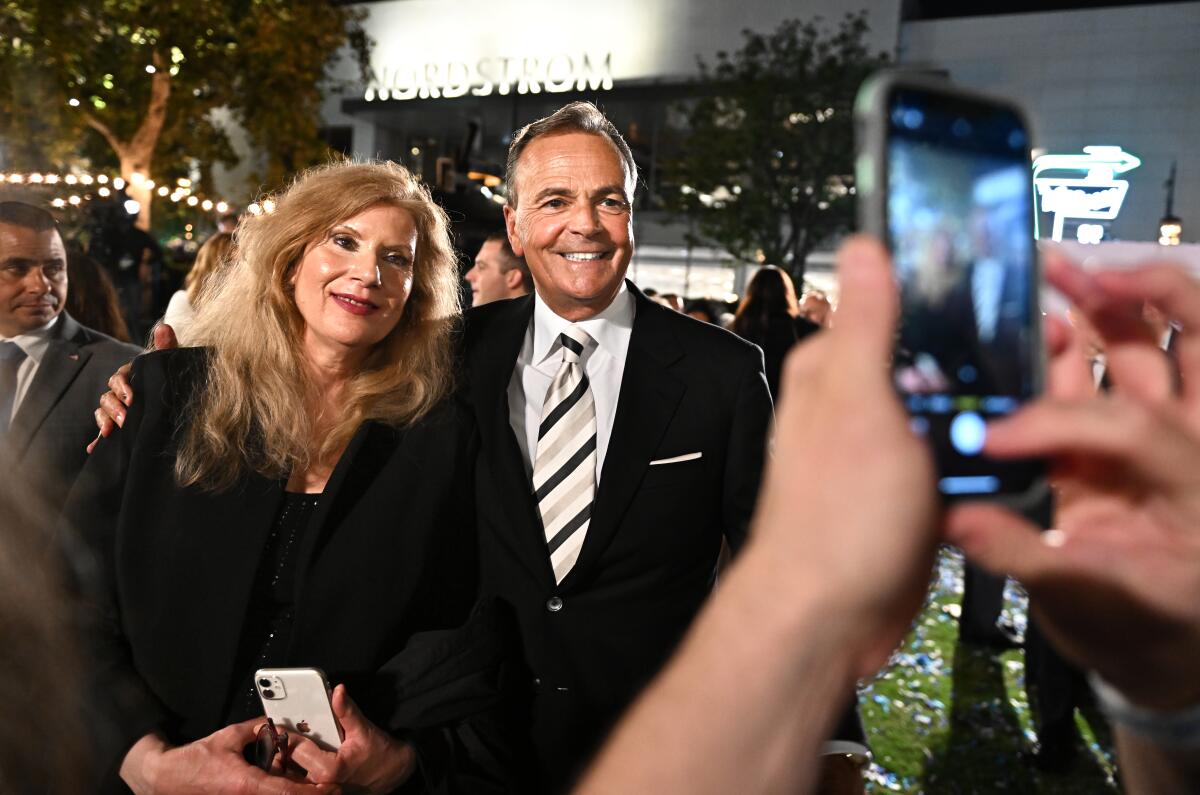
- Share via
Developer Rick Caruso’s showing in the mayoral primary Tuesday demonstrated that a significant number of Angelenos want immediate changes on homelessness and aren’t turned off by the vast fortune of a billionaire who has never held elected office.
Caruso will face Rep. Karen Bass in the general election after the two candidates topped the field in a race focused on the unhoused and crime, a contest viewed as a judgment on City Hall’s handling of those issues.
Both Democratic and Republican voters in Tuesday’s election backed the developer, a onetime Republican who jumped in the race just four months ago and is seeking big changes in city government. He has proposed bypassing the City Council on homeless housing decisions, as well as removing their ability to oversee land use — a step that follows several FBI investigations of local politicians.
Billionaire real estate developer Rick Caruso holds a narrow lead over U.S. Rep. Karen Bass in the race to replace Mayor Eric Garcetti.
In initial results, Caruso was leading Bass, 42% to 37%, on Wednesday.
His campaign — which tapped his own wealth and relied on an unprecedented $40 million in spending — resonated in the heavily Democratic city, where voters are frustrated by the intractable homelessness crisis, unaffordable home prices and rising gun violence.
Political consultant Eric Hacopian said a “perfect mix” of elements helped Caruso come out on top on Wednesday.
“He has maximum resources,” Hacopian said. “He’s right at where a lot of voters are on the issues.”
As Bass gathered with her supporters on election night at the W Hollywood hotel, she described the mayoral election as a “fight for the soul of our city.”
Bass has touted her leadership skills and experience in state and national government, arguing that she will bring communities together to ease the homelessness crisis. She talks in nuanced terms about the problem, compared with Caruso’s simpler message. “Homeless people are not monolithic,” she told The Times earlier this year, so no one solution will work for any two people.
At the same time, a victory for Bass in November would make her a groundbreaking figure. She would be the first Black woman — and the first woman — to hold the office.
Bass’ allies say that Caruso — whose campaign message is “Caruso can” — is offering unrealistic goals around police hiring and housing the homeless. Lofty promises helped sink past L.A. mayoral candidates: Wendy Greuel was criticized in 2013 for failing to explain how she would pay for the 2,000 new police officers she sought.
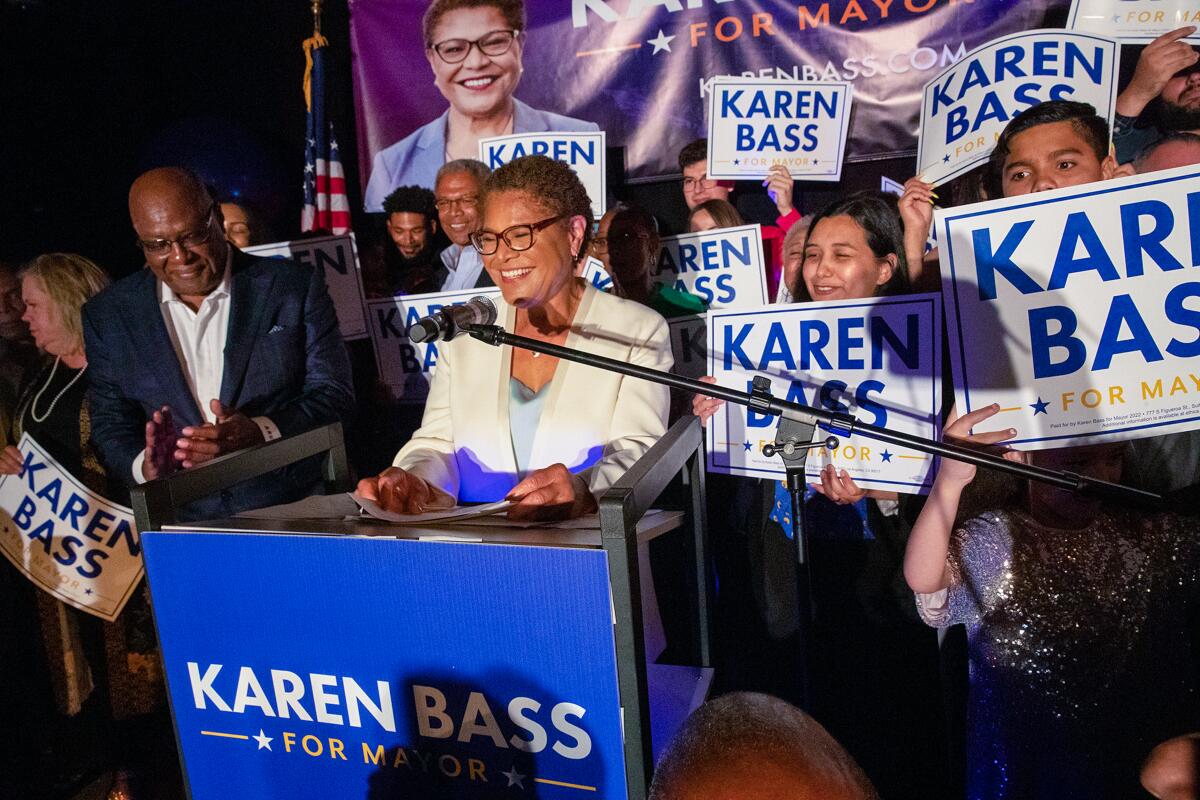
At his election night party at the Grove, Caruso attacked Bass over comments she made in a Wall Street Journal story published this week. She told the publication that the city isn’t going to solve the homelessness problem in four years, but she hopes that “Angelenos, housed and unhoused, see a light at the end of the tunnel” after that time period.
“Whoa,” Caruso told his supporters, comments that suggested he would do better than Bass. “Well, let me respond by saying this. The light at the end of the tunnel is shining bright tonight.”
In the coming months, the two candidates will face scrutiny over their respective policy plans and promises. Voter turnout is also historically larger in November.
Raphael J. Sonenshein, executive director of the Pat Brown Institute for Public Affairs at Cal State L.A., said November’s election will be “a whole new deck of cards.”
Abortion could also be a relevant issue, given that the Supreme Court is widely expected to issue a ruling that could overturn Roe vs. Wade, resulting in the restriction of abortion rights in some parts of the country.
The primary election will help determine Los Angeles’ next mayor and sheriff.
“National stuff is going to affect the runoff. I don’t think there’s any question about that,” he said. “We can’t yet imagine how different November’s going to be.”
The attacks in the mayoral race are certain to escalate following a barrage of negative ads aimed at both candidates in the primary.
Polarizing because of his massive wealth, Caruso also energized some voters to back other candidates to stop him from getting 50% in the primary and winning outright.
In Echo Park, voter Patrick Bailey said Tuesday that he supported Bass. There were more progressive candidates he liked in the race, he said, but he didn’t think they had a chance of winning. “I just didn’t want Caruso to win,” said Bailey, 35, adding that he didn’t want to see a billionaire take office.
Paul Pulido, a 63-year-old security manager, cast a ballot in Lincoln Heights for Caruso. Pulido, who said he is a registered Republican, was one of several voters who told The Times that they were frustrated by homelessness. “I’m fed up,” he said.
The initial mayoral primary results didn’t match the findings of a recent UC Berkeley Institute of Governmental Studies poll co-sponsored by The Times. That poll, taken conducted May 24-31, showed Bass leading Caruso by 6 percentage points. The margin of error was 3.5 percentage points.
The primary was just a pregame warmup. Now, as we love to say in Laker land: It’s showtime.
Voters’ support for a shake-up was also seen in the race for Los Angeles city controller, where newcomer Kenneth Mejia advanced to the run-off and will face City Councilman Paul Koretz, a politician with three decades of experience in elected office.
Mejia sparked a loyal following by releasing TikTok videos and billboard messages about the city budget that appear to have resonated with younger, progressive voters. Initial results showed him leading Koretz by more than 10 points.
At the same time, voters preferred familiar faces in some City Council races. In South Los Angeles, Councilman Curren Price was far ahead of the only opponent on the ballot, college administrator Dulce Vasquez. And in the San Fernando Valley, council members Bob Blumenfield and Monica Rodriguez were both easily reelected.
Times staff writers Jeong Park, Rachel Uranga, David Zahniser and Benjamin Oreskes contributed to this report.
More to Read
Sign up for Essential California
The most important California stories and recommendations in your inbox every morning.
You may occasionally receive promotional content from the Los Angeles Times.
